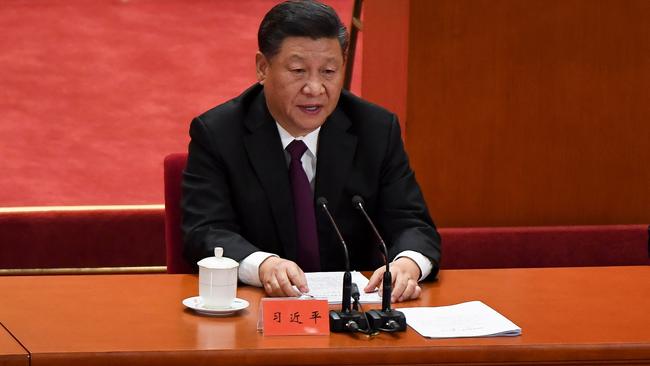China President Xi Jinping swears by Communist Party rule
Big reforms must wait as the Chinese leader has signalled tigher social and political control over the nation amid slowing growth.

President Xi Jinping’s landmark speech at the Great Hall of the People in Beijing yesterday was a stark reminder to anyone doing business with China: the country remains a Communist Party-run state that will, if anything, further impose its will on its people.
In one sense China since 1949 has never pretended to be anything other than a Communist Party-led country. But Xi’s 90-minute speech yesterday was a very deliberate reinforcement of the critical central role of the Communist Party in China’s economic future.
While those in the West argue that political freedom is an essential part of allowing an economy to develop to its full potential — a theme hinted at in the famous speech made in Singapore by then foreign minister Julie Bishop in March last year that irritated Beijing — Xi was able to point to China’s 40 years of astounding economic success to argue the merits of China’s unique model of “socialism with Chinese characteristics”.
Anyone expecting that Xi would follow his famous predecessor Deng Xiaoping in announcing further reform of the economy would have been sorely disappointed with the speech.
While people in the West would argue China’s astounding economic success of the past 40 years was because the government in China had got out of the lives of many ordinary Chinese, allowing them to set up businesses and have a life in many ways similar to people in the West, Xi argued strongly yesterday that success came about because of its unique approach to managing its social and economic system.
A system with “Marxism as its guiding ideology”, where “the Communist Party is the backbone of the Chinese people and the Chinese nation”, had delivered economic progress in spades.
China had been doing things in its own way, he argued, and would continue to do so. If anything, he argued, it was important for all Chinese, including those overseas, to get more firmly behind the party and its central committee.
Forty years ago, as China began to open its doors to the rest of the world, it sought help and advice from other countries on the best way to develop. A new report marking the 40 years of the Australia-China Council, released this month, is full of historic black and white photos of Chinese coming to Australia to learn about raising sheep. There’s pictures of China turning to the Australian media for help in setting up the China Daily and wide-eyed Chinese students getting their first taste of Western standard universities.
Until a decade ago, when the global financial crisis hit, Chinese officials were still actively seeking guidance from the West — its politicians, academics and business leaders — on the best way to regulate and develop its economy and financial system.
As Australian journalist Richard McGregor points out in his 2010 book, The Party, the advent of the global financial crisis in 2008, which gripped the Western world, was the beginning of a change in view in China about how much it could continue to learn from the West.
Yesterday’s speech was very much a statement of increasing self-confidence.
“No one is in a position to tell China what should be done,” Xi declared emphatically.
In speech after speech, Xi continues to declare his support for continued “economic reform and opening up”. It is clear that this will involve continued measures to allow more foreign goods to be sold in China, and a continued step-by-step relaxation of controls on foreign investment in China, including buying Chinese shares.
But there is no stomach for any bold new economic changes that will reduce the current role of state-owned enterprises in the Chinese economy or see a critical reform of China’s banking system.
While declaring that he had “full faith in the decisive role of the market”, Xi made it clear he saw China as a country where the public sector would continue to play the dominant role.
Major reforms such as a free float of Chinese currency, or a deregulated banking system, for example, are off the table in the interests of “stability”.
Foreign banks can continue to play at the edges. But the idea of some previous Chinese leaders that robust competition from foreign players would be allowed as a means of putting pressure on local banks to improve their efficiency is not on, if it ever was.
The next few years may well see an increasing role of the state sector in China as the private sector bears the brunt of the economic slowdown now under way.
US President Donald Trump’s trade war with China is hitting the private factories of southern China — once the engine of China’s economic opening up — the hardest.
Xi’s speech comes amid debates about how much the Chinese economy is slowing as a result of the Trump-led trade war, a slower world economy, an ageing domestic population, increasing regulation of the economy — including strict measures to control pollution — and a sharp contraction of credit in China.
In one sense Xi’s push for tighter social and political control over the country could be a response to his knowledge that China is facing tougher times ahead.
Over the past 40 years, the Chinese economy averaged an annual average economic growth rate of more than 9 per cent — a staggering feat by any standards that has never been done anywhere else before. But with official growth levels headed to 6 per cent and lower — and that after the gains of further economic stimulus expected to be announced in the next few months — the next 40 years are going to be more challenging for the economic miracle that has been China.



